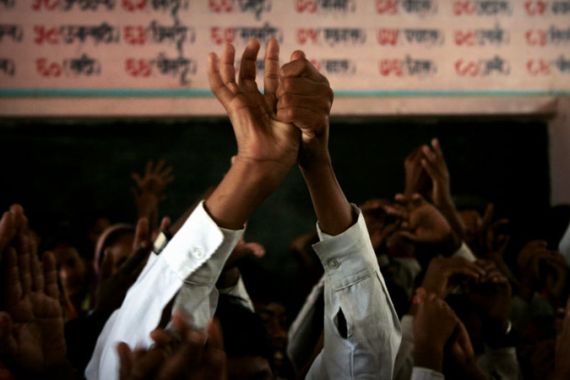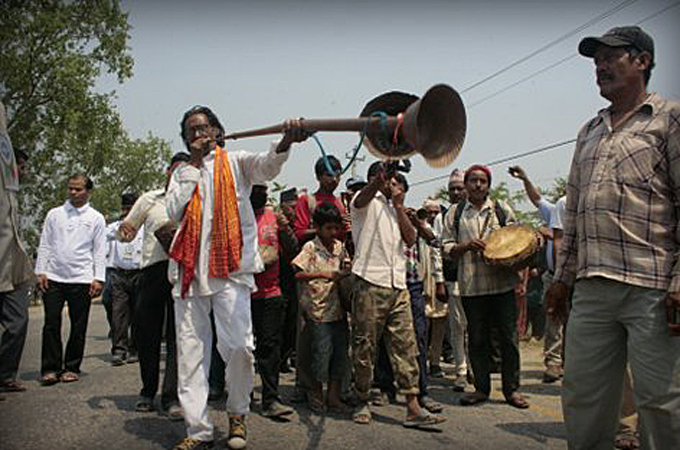Nepal’s ‘Mr Toilet’ on a clean-up mission
One man’s sanitation crusade to have toilets in every household, in a nation where 40 percent don’t have any.

Kathmandu, Nepal – In a secondary school classroom in Kapil Vastu, one of Nepal’s poorest districts, Namaste Lal Shrestha’s gentle enthusiasm swiftly disarms his audience.
“Namaste! I am Namaste,” he said, pausing for the group to laugh at his namesake, which is the equivalent of “hello” in Nepalese. He then leads students in a mock hand-washing drill and solicits stories from those who have recently built toilets in their homes.
I realised by visiting so many places that we are a small country, but extremely diverse, and no single approach to sanitation is going to work anywhere.
For more than three decades, Shrestha has been spearheading a campaign to discourage people in this Himalayan nation from defecating in the open, thereby earning him the nickname “Mr Toilet”.
Living in remote Humla district in the western Himalayas, Shrestha knew one thing: When you saw stool on the trail, that was the way to the nearest village.
“People defecate on trails because they are public land, so that’s how you would know you were on the right track,” said Shrestha, recalling his three years spent in the rural mountains.
“After six months of living there, I was so sick that a doctor told me to move back to [the capital] Kathmandu,” he said.
“But I knew I was a healthy person, and I knew something in the local lifestyle must be making me sick, so I stuck around to figure out what it was and how it could be changed.”
Public health blunder
The trailside excrement maxim remains in use today in Nepal, a country where 40 percent of households, according to a 2011 census, still lack toilets. But in practice it is becoming less true.
Shrestha, now a WASH (water and sanitation) officer with UNICEF, has led the charge to end an overlooked public health blunder of the 21st century – namely allowing defecation in the open, which has been linked to water contamination and the spread of infectious diseases, including cholera.
While the move to construct toilets and end open defecation in Nepal, a country of 27 million, has had many phases and players, Shrestha’s evangelical charisma has placed him at the forefront of shaping what he refers to as a “total sanitation social movement”.
Thirteen of the country’s 75 districts have been declared “Open Defecation Free”, meaning each home and public building has a functioning toilet. And, according to Shrestha, seven more will hit the target in 2014. Conceived in the wake of a devastating diarrhoea outbreak in 2009, the country’s national sanitation plan aims to have toilets in every home by the end of 2017.
‘Whistle-blowing’
 |
|
Shrestha has been spearheading a campaign to discourage people from defecating in the open [Kyle Knight/Al Jazeera] |
What began as an effort to improve his own and his neighbours’ health in Humla in the 1980s, has grown into a 30-year campaign during which Shrestha has visited each of Nepal’s 75 districts. Encountering different actors and motivations in each location inspired him to change his thinking about what works.
“There are so many development agencies and projects in Nepal,” he said, referring to the nearly $1bn a year in foreign aid the country, ranked 157th on a global development index, receives.
“I realised by visiting so many places that we are a small country, but extremely diverse, and no single approach to sanitation is going to work everywhere,” he said.
Shrestha points to local campaigns such as “whistle-blowing”, where children call out people defecating in the open with shrieking whistles, to illustrate his point. Another is sanitation cards, where family members cannot access government services, such as citizenship documents or passports unless they have first obtained certification that they have a toilet at home.
“Some people say these programmes violate human rights,” Shrestha admitted. “Everyone has the right to citizenship, the critics say, regardless of whether they have a toilet. But everyone also has the right to health, and if you are not building a toilet you are infringing on your neighbours’ rights to be healthy,” he said.
“The key is that each initiative is driven by the local community, not the government or development agencies – we promote sanitation, but they decide how to implement it,” Shrestha said.
The government, which has backed Shrestha’s stance, in a controversial policy shift beginning in 2011, decided to cut government subsidies for toilet construction.
Shrestha said that “subsidy cuts have driven up demand for toilets”. “Previously people would sit around and wait for the subsidy to build their toilet, so there was always an excuse not to have one,” he said.
Sanitation subsidies
Other experts, however, disagree.
“The subsidy cuts by the government are harmful to efforts to make these programmes practise,” said Ben Ayers, Nepal country director for the dZi Foundation, which works on sanitation in remote communities in Nepal’s eastern hills.
The key is that each initiative is driven by the local community, not the government or development agencies - we promote sanitation, but they decide how to implement it.
“Subsidies allow you to ensure equitable coverage for everyone, regardless of socio-economic status. When the subsidies disappear, those who cannot afford toilets can fall victim to the whims of people already in power and perpetuate existing discriminatory structures,” he explained.
Policy experts say there is no single approach to subsidies for sanitation.
“There are sound ethical and economic arguments both in support and against subsidies for sanitation projects,” said Nathaniel Mason, a research fellow at the London-based Overseas Development Institute (ODI).
“In practise, what is appropriate comes down to the social norms in a given context and expectations created by past practise – for households, service providers, or government politicians and policy makers,” Mason said, pointing to a recent ODI report that tracked a trend from subsidised “supply-driven” sanitation programmes to non-subsidised “demand-driven” programmes around the world in recent decades.
But regardless of the controversy, Shrestha said the movement to end open defecation in Nepal reflects a much-needed confidence boost while the country’s politics remains mired in protracted debates trying to draft a constitution.
“Building toilets, improving local health – people see and react positively to that on a lot of [different] levels,” Shrestha said. “It’s the anti-failure narrative at a time when so many other voices just repeat that Nepal has failed to do one thing or another.”